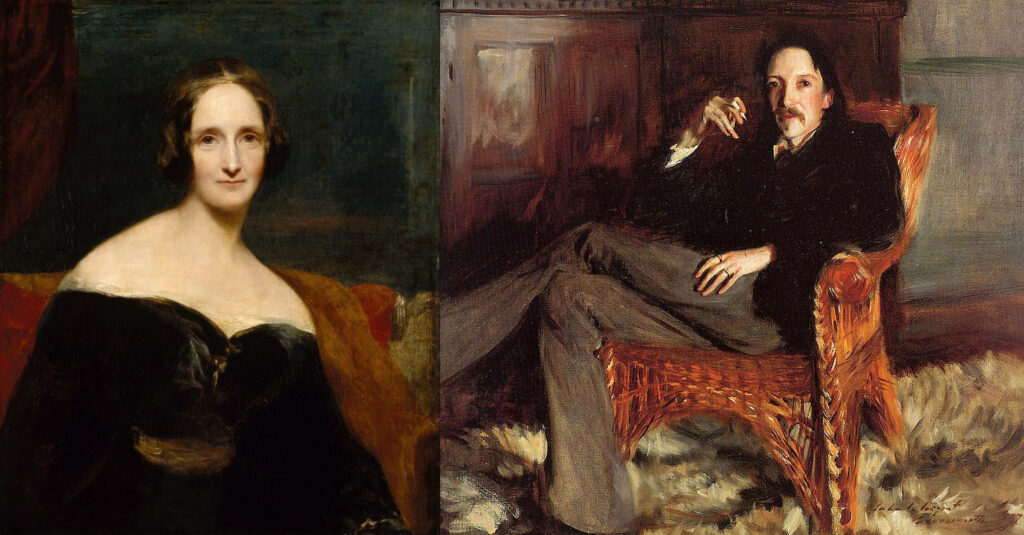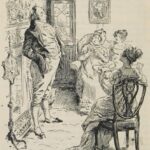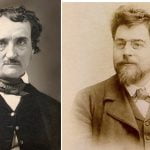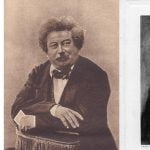
Interviewer: Good evening, once again, to our dear audience. In this program, which we’ve called “What do you think about…?”, we have, today, two emblematic writers of the Gothic novel. Ladies and gentlemen, let us cordially greet Mary Shelley, author of Frankenstein; or, The Modern Prometheus,and Robert Louis Stevenson, best known for Treasure Island and The Strange Case of Dr. Jekyll and Mr. Hyde. (Speaking to both of them) Dear friends, thank you for accepting this invitation.
Mary Shelley, Robert Louis Stevenson (in unison): It’s a pleasure.
Interviewer: You may find it strange that I should say this, but…
Robert Louis Stevenson (intrigued): What’s it about?
Interviewer (with a sigh): I’ve always wanted to be a writer! It must be a fascinating job, right? Besides, it must be a constant challenge.
Robert Louis Stevenson: Oh, I see! Perhaps you’re idealizing this profession. “Our business in life is not to succeed, but to continue to fail in good spirits”.
Interviewer (visibly disappointed): Really?!
Robert Louis Stevenson: Of course! What did you think? “The difficulty of literature is not to write, but to write what you mean; not to affect your reader, but to affect him precisely as you wish”. Do you understand what I mean?
Interviewer: I must certainly do! However…
Robert Louis Stevenson (with a peculiar tone of seriousness): Listen, I know you’re disappointed. But take my advice, and stay out of trouble. It’s sad, but more often than not, “a man finds he has been wrong at every stage of his career, only to deduce the astonishing conclusion that he is at last entirely right”.
Interviewer: Even so…
Robert Louis Stevenson (patting him on the shoulder): Come one! Don’t be discouraged! And come to your senses. “Books are good enough in their own way, but they are a mighty bloodless substitute for life”.
Interviewer: That’s not a very optimistic view! But perhaps you could give me your opinion on some writings —mine, of course— that I’ve treasured since childhood.
Robert Louis Stevenson: Oh, childhood! Oh, youth! Let’s see. “Life is not a matter of holding good cards, but of playing a poor hand well”.
Interviewer: I agree! Nevertheless, I wish…
Robert Louis Stevenson (in a complacent tone): “By all means begin your folio”. I’ll keep repeating it. “Even if the doctor does not give you a year, even if he hesitates about a month, make one brave push and see what can be accomplished in a week. It is not only in finished undertakings that we ought to honour useful labour”.
Interviewer: No offense, but I think you’ve misunderstood me. Would you like to read the stories I’ve written?
Robert Louis Stevenson (absent-mindedly): Absolutely! Someday! There’s no hurry. After all, “is there anything in life so disenchanting as attainment?”.
Interviewer (frustrated, to himself): Perhaps it’s best to drop this subject…
Robert Louis Stevenson: What are you worrying about?! Do as I do, and enjoy life and what it offers you a little. “Wine is bottled poetry”. Come on, let’s raise a glass!
Interviewer (addressing the only lady in the room):Ma’am… Let’s get started, shall we? Could you please answer a few questions about your writing career?
Mary Shelley: Of course, it will be my pleasure. But first, don’t worry; I beg you. “Nothing contributes so much to tranquillize the mind as a steady purpose—a point on which the soul can focus its intellectual eye”. Someday you may create a valuable work.
Interviewer (still distressed): You have no idea how grateful I am!
Robert Louis Stevenson: That’s true. “To be wholly devoted to some intellectual exercise is to have succeeded in life”.
Mary Shelley: No doubt. Think about it this way. “A human being in perfection ought always to preserve a calm and peaceful mind and never to allow passion or a transitory desire to disturb his tranquility”. Do you get me?
Robert Louis Stevenson: That’s right! “Quiet minds cannot be perplexed or frightened, but go on in fortune or misfortune at their own private pace, like a clock during a thunderstorm”.
Interviewer: Quite true.
Mary Shelley: And yet, I think it’s prudent to say that “we never do what we wish when we wish it”.
Robert Louis Stevenson (nodding): No doubt.
Mary Shelley: “…and when we desire a thing earnestly, and it does arrive, that or we are changed, so that we slide from the summit of our wishes and find ourselves where we were”.
Interviewer: I couldn’t agree more. I’ve been an idiot! (wiping away tears) I must apologize… I’d like…
Robert Louis Stevenson: Yes, sir?
Interviewer: Uh… perhaps…
Mary Shelley (in a motherly tone): Listen to what I have to say. “I required kindness and sympathy, but I did not believe myself utterly unworthy of it”.
Interviewer: Why would you say that?
Mary Shelley: I have my reasons. And one of them is that, for a time, “solitude was my only consolation —deep, dark, deathlike solitude”. Except, perhaps, on one occasion.
Interviewer: Which one are you referring to?
Mary Shelley: Well, you see… In May 1816, I decided to stay at Villa Diodati with my son William, his father, Percy and Claire Clairmont, to whom we were related by blood.
Interviewer: Yes, I know. Please go on.
Mary Shelley: “It proved a wet, ungenial summer and incessant rain often confined us for days to the house”. It was then that Lord Byron, our host, suggested that we each write a horror story.
Interviewer: I understand perfectly. Go ahead.
Mary Shelley: As I was saying… In spite of the difficulties, at least for me, at some point “my imagination, unbidden, possessed and guided me”. “I saw—with shut eyes, but acute mental vision”. “I saw the hideous phantasm of a man stretched out, and then, on the working of some powerful engine, show signs of life and stir with an uneasy, half-vital motion…”.
Interviewer: How chilling! I imagine you’re referring to Frankenstein; or, The Modern Prometheus. What you just described must have been a most disturbing apparition.
Mary Shelley: Indeed! “Frightful must it be; for supremely frightful would be the effect of any human endeavor to mock the stupendous mechanism of the Creator of the world”.
Robert Louis Stevenson (in an emphatic tone of voice): This reminds me of an anecdote!
Interviewer: Please tell us which one! Don’t hold back!
Robert Louis Stevenson (with enthusiasm): One night, I was fast asleep, when my wife suddenly woke me up. It turns out I was screaming like crazy! Imagine that! I had to reprimand her and assure her,“I was dreaming a fine bogy-tale!”.
Interviewer: Are you referring to The Strange Case of Dr. Jekyll and Mr. Hyde?
Robert Louis Stevenson: No more, no less.
Interviewer: Fascinating! How important was your wife’s contribution to the creation of this piece?
Robert Louis Stevenson: Of great importance! As a result of Fanny’s harsh criticism, I threw my first draft into the fire.
Interviewer: Do you swear that what you say is true?
Robert Louis Stevenson: I could swear it. But “I’ve a grand memory for forgetting”.
Interviewer: Could you clarify whether or not you were inspired by the misdeeds of Deacon Brodie in the 18th century, as well as the controversial case of Eugene Chantrelle, who was convicted of murdering his wife in 1878?
Robert Louis Stevenson: Well… It’s possible that both stories influenced my writing without my knowledge.
Interviewer: Prior to Eugene Chantrelle’s case, nothing like this had ever occurred.
Robert Louis Stevenson: That we know of! You know what? While the trial was taking place, I went more than a few times to witness it. In fact, I could even refer to Mr. Chantrelle as Edward Hyde’s landlady, one of the many characters in my novel. “She had an evil face, smoothed by hypocrisy; but her manners were excellent”. Mr. Chantrelle was like this, which has led me to think that “all human beings, as we meet them, are commingled out of good and evil”.
Mary Shelley (to Robert, somewhat hesitantly): Still, do you think any of them would have been happy? “When falsehood can look so like the truth, who can assure themselves of certain happiness?”.
Robert Louis Stevenson: Well, it’s likely that neither of their behavior had any influence. In any case, you’re forgetting that “the Devil, can sometimes do a very gentlemanly thing”.
Mary Shelley: I don’t think I agree with you.
Robert Louis Stevenson: I take your point, believe me. But, on reflection, “there is only one difference between a long life and a good dinner: that, in the dinner, the sweets come last”. “Sooner or later we all sit down to a banquet of consequences”.
Interviewer: Do you really think so?
Robert Louis Stevenson: Of course! “The true wisdom is to be always seasonable, and to change with a good grace in changing circumstances. To love playthings well as a child, to lead an adventurous and honourable youth, and to settle when the time arrives, into a green and smiling age, is to be a good artist in life and deserve well of yourself and your neighbour”.
Mary Shelley: Sadly, “I am in the condition of an aged person— all my old friends are gone and my heart fails when I think by how few ties I hold to the world”. “How mutable are our feelings, and how strange is that clinging love we have of life even in the excess of misery!”.
Interviewer: Dear Mary, please don’t think like that.
Mary Shelley (in a tragic tone): Don’t worry. “I seek not a fellow-feeling in my misery. No sympathy may I ever find. When I first sought it, it was the love of virtue, the feelings of happiness and affection with which my whole being overflowed, that I wished to be participated. But now, that virtue has become to me a shadow, and that happiness and affection are turned into bitter and loathing despair, in what should I seek for sympathy?”.
Robert Louis Stevenson (bowing slightly toward Mary): “You cannot run away from a weakness, you must sometimes fight it out or perish. And if that be so, why not now and where you stand?”.
Interviewer: Yes, absolutely! If I’m not mistaken, you began your writing career at the age of nineteen.
Mary Shelley: I understand that you see it that way, and “I am the more willing to comply, because I shall thus give a general answer to the question, so very frequently asked me—’How I, then a young girl, came to think of, and to dilate upon, so very hideous an idea?”. All I can say is, “the world was to me a secret which I desired to divine. Curiosity, earnest research to learn the hidden laws of nature, gladness akin to rapture, as they were unfolded to me, are among the earliest sensations I can remember”.
Robert Louis Stevenson: And you have done a splendid job.
Interviewer: Certainly you have.
Mary Shelley: Yes, but it hasn’t been easy. Now, “everywhere I see bliss, from which I alone am irrevocably excluded”. Let’s face it. “Women are told from their infancy, and taught by the example of their mothers, that a little knowledge of human weakness, justly termed cunning, softness of temper, outward obedience and a scrupulous attention to a puerile kind of propriety, will obtain for them the protection of man”.
Interviewer: You have first-hand experience, but I’m not sure if that’s entirely accurate.
Mary Shelley: When I got married, I realized how ignorant I was. It was then that I realized that “marriage is usually considered the grave, and not the cradle of love”.
Robert Louis Stevenson: Ah! My beloved Mary! “In marriage, a man becomes slack and selfish, and undergoes a fatty degeneration of his moral being”.
Mary Shelley: I couldn’t have said it better myself.
Robert Louis Stevenson: That’s awful, and I’m sorry for you. In many cases, “the cruelest lies are often told in silence. A man may have sat in a room for hours and not opened his teeth, and yet come out of that room a disloyal friend or a vile calumniator”.
Mary Shelley: Exactly.
Interviewer (looking at the watch on his left wrist): Sorry for the interruption, but we’re out of time today. Our next broadcasts will feature this show’s regular host, so please tune in.
Robert Louis Stevenson (astonished): What are you talking about? I thought you were the host of this show!
Interviewer: No. Our host has taken a few days off.
Mary Shelley: That’s a shame. Was it for a particular reason?
Interviewer (pausing briefly): Uh… She’s a bit exhausted after doing a few interviews.
Robert Louis Stevenson: May I ask with whom?
Interviewer: Among many others, Jane Austen and Charlotte Brontë.
Robert Louis Stevenson: Oh! I understand perfectly.
Interviewer (with the studio lights now off): That’s all for today. See you next time!
END OF TRANSMISSION


